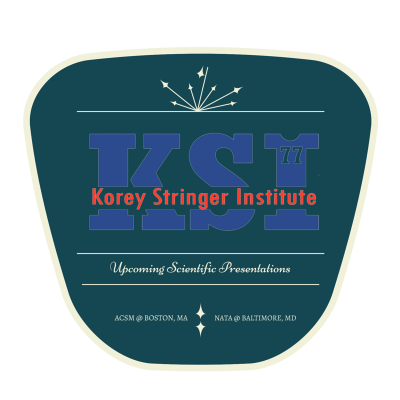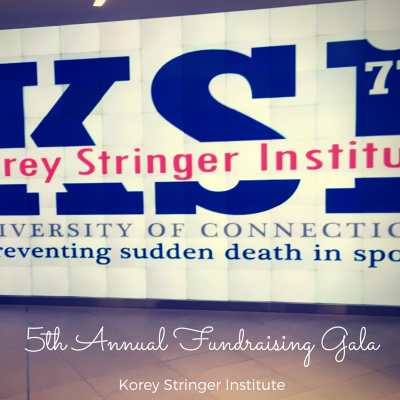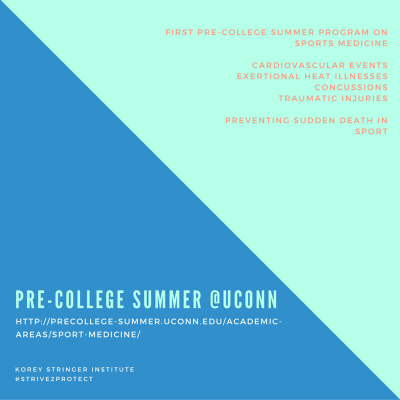By Sarah Attanasio, Assistant Director of Research

Come visit and engage with the KSI staff members at the upcoming annual NATA and ACSM Conferences. Find out which members are presenting, where and about what can you expect to learn from each presentation below.
The American College of Sports Medicine 63rd Annual Meeting- May 31- June 4th 2016- Boston MA
William Adams, PhD, ATC– Thematic Poster
“Thirst as a Marker of Hydration Status During and After Exercise in the Heat”
Date: Wednesday, 6/1; 1:00-3:00pm
Yuri Hosokawa, MAT, ATC– Poster Presentation
“Assessing Warm Weather Race Preparedness Using the Heat Stress Score”
Date: Thursday, 6/2; 2-3:30pm
Lesley Vandermark, PhD, ATC, EMT, PES– Poster Presentation
“Beverage Content Influences Voluntary Fluid Intake During Exercise: A Systematic Review”
Date: Thursday, 6/2; 2-3:30pm
Douglas Casa, PhD, ATC, FACSM, FNATA– President’s Lecture
“Preventing Sudden Death in Sports and Physical Activity: The Struggles (and Successes) to Implement Evidence into Clinical Practice”
Date: Thursday, 6/2; 10:30- 11:20am
Douglas Casa, PhD, ATC, FACSM, FNATA– Symposium
“Preventing, Recognizing, and Treating Exertional Heat Stroke at Endurance Events”
Date: Thursday, 6/2; 9:20-9:45am
Samantha Scarneo, MS, ATC– Free Communication/Slide
“Lower Extremity Injury Risk in Youth Female Basketball Athletes with and without a History of Concussion”
Date: Friday, 6/3; 1:00-3:00pm
The National Athletic Trainers’ Association 67th Clinical Symposia and Expo- June 22-25th 2016- Baltimore MD
William Adams, PhD, ATC– Minicourse
“Developing and Implementing Evidence-Based Best Practice and Procedure for the Prevention of Sudden Death in Sport”
Date: Wednesday 6/22; 5:15-6:15pm
Lesley Vandermark, PhD, ATC, EMT, PES– Free Communication Oral Presentation
“Investigation of Provisional Medical Care in the Public Secondary School Setting”
Date: Thursday, 6/23; 9:15-10:15am
Rachel Vanscoy, MS, ATC– Poster Presentation
“Does The Shortened Environmental Symptoms Questionnaire Accurately Represent Physiological Adaptations Following a 10 Day Heat Acclimation Protocol?”
Date: Thursday, 6/23; 11:15-12:00pm
Rachel Katch, MS, ATC– Poster Presentation
“Use of the Heat Stress Score to Predict Preparedness to Run in an Outdoor, Warm Weather Race”
Date: Thursday, 6/23; 11:30-1:15pm
William Adams, PhD, ATC– Poster Presentation
“Policy Changes Reduce Exertional Sickling Related Deaths in Division I Collegiate Football Players”
Date: Thursday, 6/23; 11:30-1:15pm
Yuri Hosokawa, MAT, ATC– Poster Presentation
“Tarp-Assisted Cooling is an Effective Method of Whole Body Cooling in Hyperthermic Individuals”
Date: Thursday, 6/23; 11:30-1:15pm
Luke Belval, MS, ATC, CSCS– Poster Presentation
“Efficacy of a Novel Cooling Vest Following Exercise-Induced Hyperthermia”
Date: Thursday, 6/23; 11:30-1:15pm
Sarah Attanasio, BS– Poster Presentation
“Occurrence of Exertional Heat Stroke in High School Football Athletes Before and After Implementation of Evidence-Based Heat Acclimatization Guidelines”
Date: Thursday 6/23; 11:30-1:15pm
Yuri Hosokawa, MAT, ATC– Feature Presentation
“Malignant Hyperthermia in Physically Active Populations”
Date: Thursday, 6/23; 1:30- 3:30pm
Alicia Pike, MS, ATC– Oral presentation
“Private Secondary Schools Use Various Individuals When Providing Medical Coverage”
Date: Friday, 6/24; 10-10:15am
Rebecca Stearns PhD, ATC– Special Topic
“Protein’s Effectiveness As An Ingredient in Hydration Beverages”
Date: Saturday 6/25; 10:45-11:45am



